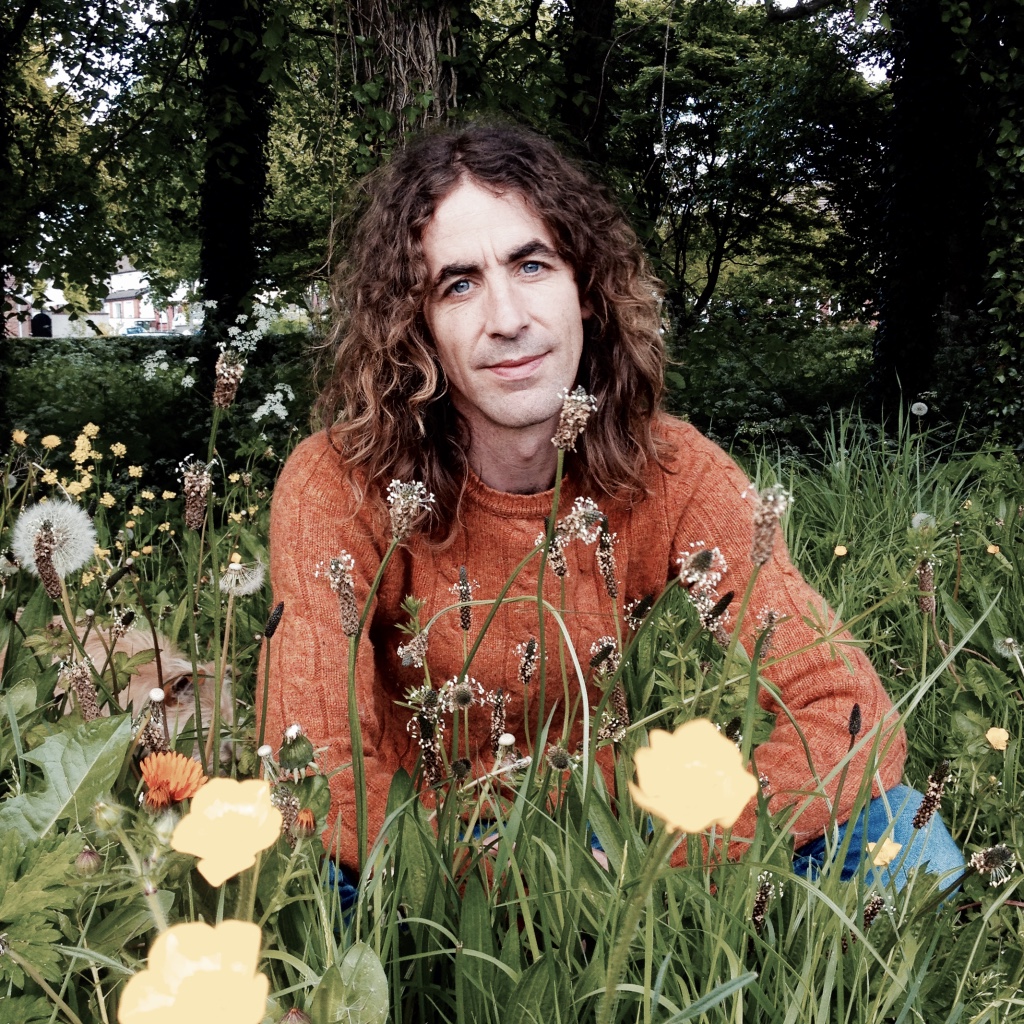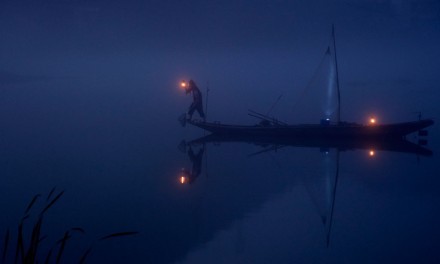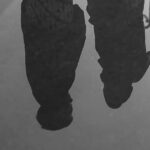THE DEEP END
★ ★ ★ ★
Essays from the depths
Theatres of the Absurd
By Richie Heffernan
In the flea-markets of Berlin, amidst all the debris of peoples lives that’s carted in to be shed every weekend, there are many boxes of old photos drawn from across mainland Europe and from every period up to about the 1980s. Unremarkable images of family and friends such as one might find in any attic, the dusty formality of older black and whites giving way to the rickety colour and dissolution of the 60’s and 70’s and then the pedestrian soup of 80s fidelity, the bland perfection of my own youth.
And as with the rows of low quality LP’s or books also on display, there’ll be the odd determined rummager rapidly sifting them in the hope of a find or a laugh.
But if you look at them closer, they provide an experience that’s indescribably sad. Cast out from the albums and people that gave them context, the random smiling faces stare back like abandoned orphans with no prospect for identity or meaning other than that which we as viewers might impulsively imagine for them.
I have spent hours doing this, in a kind of trance, conjuring up entire lives from a facial expression or the look of an eye–searching for hints of whatever evil or banality might have befallen them, their hopes and ideals, priorities, obstacles, their passing.
Here are the people who voted for Hitler, or were the stonemasons of Ceaușescu’s palaces, or whose children rebelled, or aspired to food and stability, or practised guitar till their fingers bled. The people who crossed the wall in ’89, or serviced buses, tilled the soil and made the dinners, who gave birth, or who died in the Somme or Iraq, who dreamt in forests, or were betrayed by Stalin.
Witnesses and participants in the broader rhythms of history, lives already lived, whose meaning resided largely in their own existence and those they held dear. Mostly unheroic, unremarkable lives in the greater sense, and like most of our own, lived in the main without the possibility of long-term remembrance.
Graveyards, public transport, long queues and waiting rooms are all rich sources of this reflexive fantasy. Great halls of mirrors that allow a glimpse of our mortality down the corridors of fading history.
And at the centre, my own point of view, endlessly reflected back. It’s intriguing to imagine what lies beyond it, what the bigger picture might be without me in the way. But of course no matter how I twist and turn, the very fact of my being limits the view. Perhaps with a bit of faith.
Reinvention
My family and I came to this city looking for bigger things. We’re from a little island off the west coast of Europe that has a troubled history with land and somehow keeps getting stuck in a housing crisis. It denied us the possibility of an affordable place to live, so we packed it in, and upped sticks in search of something better.
To us, the promise of Berlin was change. Its narratives of reinvention appealed to our longing for escape and fulfilment. But it’s also a duality symbolised by the post-war efforts of the Trümmerfrauen, or rubble women who had to shut out enough of the death, rape, hunger and guilt of their daily existence to re-cast their city from its ruins.
Such change has made Berlin a city of layers, of odds and ends, untidy, unkempt and unsure of what exactly it is. For decades, this lack of coherency and centralised vision has allowed space for difference to bloom. But it has been under constant assault since reunification and the consequent massive inflow of private capital. Brick by brick, developers have reclaimed the possibility of profit and by now gentrification has usurped much of the ethic that gave the city its charm. However the job isn’t quite done yet.
The Ties that Bind
As a family of dreamers who’d been spending our summers here for some years, we didn’t realise it would prove so hard to settle in. It’s a great city if you’re carefree and mobile, or even if you’re already a captive German, but if you’ve kids in tow the mighty weight of its legendary bureaucracy quickly starts to rein you in.
From the moment of registration the process begins of wrapping up every aspect of your being in a bind of arcane paperwork so tight that conformity becomes absolutely inevitable. There is no other way, no room for manoeuvre. When real life doesn’t quite fit in the box, as often happens, and the way is unclear, asses are covered by shouting and throwing more paperwork about. It is, in my experience, a system of cold indifference and hierarchy, of bullies jockeying for position, reinforcing a pathological culture of accountability.
Paradoxically for such an open-minded city, there’s a heritage of conformity and pettiness that certainly has roots in the old East Germany, but probably even further back. Even the crazy punks won’t cross the road until the light turns green. People love to put you right, inform you that you’re doing things the wrong way. It’s partly a sense of being a good citizen, but possibly also a working out of social contexts, with individuals seeming to flip quite easily between domination and submission.
Out of Touch
Monty Python have a great sketch about the Spanish Inquisition popping up in 1960s England. They race around on public transport, frantically trying to inflict their terror on indifferent members of the public. But they’re so out of time that they just seem absurd.
Ideas out of context usually look pretty odd. Think of the images of Göring or Hess laid bare in the dock in Nuremberg, their ideology in ruins, and it’s hard to grasp how people could have colluded en masse with a set of characters and beliefs so clearly insane.
But then if aliens were to visit us our planet now imagine how bizarre our ways of being would appear to them? How would they comprehend our system of distribution where one percent of us has as much wealth as the rest combined, or that the same set-up has us on the brink of environmental collapse?
As I shop for my kids’ clothes in Primark or queue for the latest round of paperwork in the Bürgeramt, should I even wonder at our collusion? We are the context.
High Fliers
As a species we’re told that one of our big differences is self-reflexive awareness. A Promethean gift that sets us apart, raising us up from mere subsistence into the hermetic and magical narratives of our own imagining. Religion, money, nationality, all our big ideas of collective will that leverage power.
When we harnessed it to our discovery of the scientific method it revolutionised our experience of space and time, dissolving the unknown, the unseen in our hall of mirrors.
But as with flight in Peter Pan, for this evolutionary sleight of hand to work we have to suspend our disbelief and fully will it with all our hearts–like a giant pedal-powered aircraft that only stays up when enough of us keep cycling together, usually in the fear of what might happen if we stop.
More or Less
We imagined coming to Berlin would free us up a little from the tensions of Ireland. That a different context might help. And it has somewhat, but we’re a bit shocked at how little. It still requires our utmost devotion to just keep up with the ever more frantic rhythms of daily existence. Just living: the long hours of school and work, homework, paperwork and bills, dinner and bed. If you fall behind you’re fucked, the smallest interruption reverberates for days.
I seem to spend a lot of my time anxiously postponing and avoiding a never-ending clutter of obligations, constantly suspending my own disbelief that I’m caught up in this shit.
Has it always been this intense? Our parents certainly worked hard, and on the face of it, many of our obligations are ones they also faced. But this is an age of more. More stuff, more credit, more availability, more obligation. And for each of these mores, a corresponding less. At some point quantitative change becomes qualitative.
I’m following a story at the moment in the Irish media about the residents of a large buy-to-let housing estate in Dublin. The state took over the troubled developers’ debt and then sold it on cheaply to a vulture fund, which then gave tenants a few weeks notice to quit. The Department of Finance are reluctant to intercede because the banks are against it. And there’s an ongoing chronic homeless crisis in Dublin.
In our building in Berlin there’s a hostel that houses refugees from a number of countries who are facing much deeper problems. Their simple quest for a stable home is not only the cause of a humanitarian dilemma in the city but is even a daily challenge to the very ideal of Europe.
At the heart of it is the fact that our most basic needs as individuals and communities, nations even, are hopelessly at odds with those of the market superstructures that subsume every aspect of our existence.
Unpayable
My wife is a schoolteacher with a permanent job back in Ireland from which she took a career break to come over here. Despite her relatively decent income, with me working part time and minding the kids, the Irish economic boom (and subsequent crash) wouldn’t give us a mortgage without deeply compromising our quality of life.
Meanwhile here in Berlin there’s a teaching crisis. They just can’t get people to fill the posts because of the disparities in rates of pay arising from the state’s endless cost reduction programmes. As I write the teachers here are striking in protest.
When I grew up a medium-sized family could live a modest life on a teacher’s salary. The basic idea of the state as an idea where we pull together to provide for our collective needs has been systematically eroded over the last few decades. In its place we are expected to become ‘entrepreneurs-of-the-self,’ and ‘customers’ of privatised state services, filling the deficit where we can from our own pockets, or better yet, with a loan.
I’m reading a book at the moment by Slovenian philosopher Slavoj Žižek. He talks of Nietzsche’s idea that what set us apart from primitive societies was our capacity to produce a human able to promise to pay others back and to recognise their debt towards the group, and so becomes a way of governing future conducts. In previous times, debts to others were limited and so could be discharged, while with the coming of empires and monotheisms, one’s social or divine debt become effectively unpayable.
For me, our predicament as caring individuals trying to make a bit of a difference, or even just trying to live a quiet life, seems to be that we’ll never be able to catch up on all the debt. Not just our own, but everybody else’s, too.
This is how the foundations are laid so that buy-to-let housing estates, teachers or entire national populations can be saddled with the risks and corresponding debts of international fiscal speculation.
Wheels within Wheels
In his book Heresies: Against Progress and Other Illusions, philosopher John Gray sees history not as an ascending spiral of human advance, or even an inch-to-inch crawl to a better world, but instead as an unending cycle in which changing knowledge interacts with unchanging human needs.
Gray believes history is where our freedom is recurrently won and lost in an alternation that includes long periods of anarchy and tyranny, with no reason to suppose that this cycle will ever end. In fact, with human power increasing as a result of growing scientific knowledge, it can only become more violent.
If these are the hard realities that prescribe our lives, what basis do we have for hope?
It was one of the thoughts that came into my head while looking at the images in the flea-market: if we were somehow able to see the sum total of ourselves and our lives, would we despair at the repetition? Maybe it’s just as well that we can’t. Maybe it’s only because our experience of existence is limited and incremental that we can keep dreaming and sustaining ourselves. Perhaps this is how we keep the possibility of our possibilities alive and cope with mortality.
Mythbusters
There was a great moment in the early twentieth century when subversive ideas suddenly became mainstream. Still with a foot in the old world, all of Europe was struggling to pull itself out of the trenches of the western front, and was hungry for new doctrines that could make sense of the chaos and point a way out of social collapse. The Bolsheviks were taking hold of Russia, and across the West everything seemed up for grabs.
The arts suddenly had an extraordinary opportunity to play with and lampoon the absurdities that had created the war. The court jesters of modernism–Dadaism and surrealism–found a temporary limelight in the salons of Paris and London as it became fashionable to shock, to expose the conceit and to party like there was no tomorrow.
Regardless of their outcomes, it’s also what appeals in the theories and actions of Marx and Lenin, or Victor Serge, Che Guevara, and Angela Davis: a great desire to puncture the myths of their times.
And it’s where I find personal hope for our own–in the efforts of the Occupy movement, Anonymous, Edward Snowdon, and Julian Assange and countless others. Anywhere people seek to transcend the limits imposed by inhuman agendas, to break the cycle.
Renewal
I believe that every ideal that has so far come to rescue us has largely failed. That while the vivid tapestry of all our great philosophies, past revolts, prescriptions, and magical notions may have led us to where we are, we can’t be bound by their trajectories. While we may possess many enlightened but fragmentary ideas about how to proceed, we essentially require a great re-imagining of our human experience if we’re to stop going round in circles.
There will inevitably be revolution in the other sense, the forcible overthrow of governments and social orders. But I think more important is a deeper comprehension that every possibility and indeed every failure is inextricably bound, that we don’t get out of this except by way of building co-operative trust with each other.
My belief is that we’re the only species on this planet with the foresight capable of deliberately plotting a path toward a desirable long-term future, our potential limited only by the scope we can imagine for it.
The way forward, if there is to be one, must be compassionate, and protective of our own mutuality and that of all species on this earth. If we’re ruthless in nature, let’s be ruthlessly bound together, as advocates against exploitation and exclusivity, avarice and murder. Let our ideologies unashamedly extol the virtues of love and honesty. Let’s hold out for an ideal of the innate decency of every single damaged one of us. Personally, it would be the death of my hope to settle for less. Even if I have to suspend my disbelief to keep it aloft.
This is my fight. This is my revolution. I have no business with any other.

Richie Heffernan is an artist and writer. From Ireland, he now lives with his family in Berlin, Germany.
























